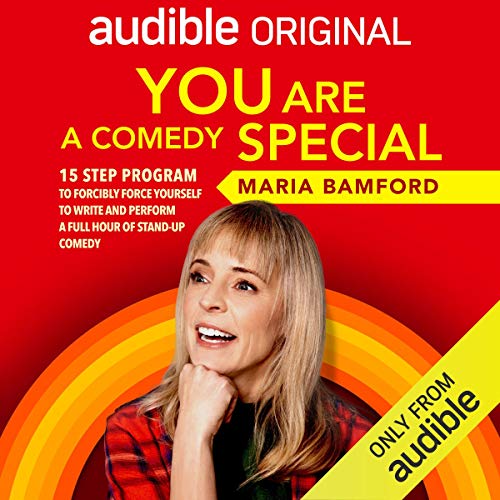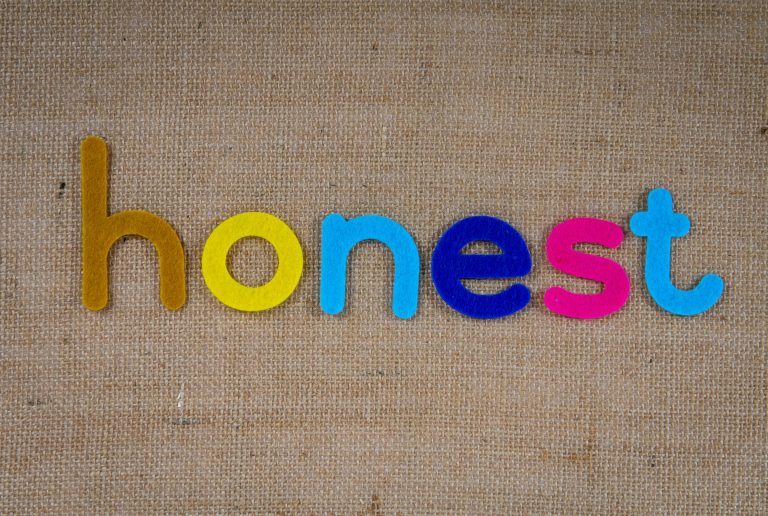Stand-up comedian Maria Bamford’s Audible original You Are (A Comedy) Special: A Simple 15-Step Self-Help Guide to Forcibly Force Yourself to Write and Perform a Full Hour of Stand-up Comedy is – well, pretty self-explanatory. The fifteen steps are all very funny and very helpful – check them out (if you have an Audible account, it’s free).
I’m an aspiring writer, not an aspiring stand-up comedian, but several of Maria Bamford’s points resonated with me from a writing perspective – maybe they’ll resonate with you as well.
‘You are your first audience member’ as a feedback filter
Maria says that your set has to make you laugh first. You are the first laugh and the most important laugh. From a writing perspective, this ‘You Are Your First Laugh’ translates to ‘You Are Your First Reader’ – and it clicked as a helpful feedback filter.
Sharing work, getting feedback, and adjusting work based on that feedback is an important part of writing. Feedback comes in all tones from an enormous range of perspectives. Advice from one person often contradicts advice from another. Filtering all that feedback is necessary – but how do I filter? What feedback do I focus on? What do I accept? What do I pass over?
As an early writer this can be a thorny question. I’m early on in my writing journey. I have one poem and zero short stories published. I don’t know what works yet; I don’t even have any published proof to fall back on. I don’t know which filter to use.
‘I am my first reader’ resonated with me. If a line or a page or a thread is working for my First Reader, that’s a good sign that it’s a keeper.
(As an aside, it does seem that whether or not advice works for us depends on the general resting state of our brains, our mental background hum. The general background hum in my brain repeats lines like, What doesn’t work is Everything! What’s keepable is Nothing! – so the advice to trust my gut reaction, my First Reader, is a welcome counter to the general state of negativity.
You may have a similar general brain state or you may have the exact opposite – and if the utility of writing advice depends on what that advice reacts to within us, then it makes sense that some of us will need encouragement to trust our scrappy intuition while others will seek shears to prune pride. I’m definitely the former; if you’re more of the latter, then you may find that the advice that works for me is a little ‘coddling’ for you, while I’ll find what works for you unhelpful and unduly sharp.)
There are always some bits that do work – so this ‘As my first reader, do I enjoy this?’ filter can muzzle the ever-critical voice in my brain as I parse through feedback on my stories. For the bits that work for my First Reader, I can filter in feedback that sharpens them. Feedback that seems to cut against those working bits (or that misses the point of them entirely), I can filter out – pressing the ever-helpful ‘THATSFINEITSNOTFORTHEM’ button. It worked for my First Reader, so it’s worth protecting.
Some bits clearly do not work for my First Reader; I can open up my filter for feedback there and incorporate whatever resonates. This part of the process will still be tough – and in fact, thinking through this has been a reminder: feedback, in general, is just rough. Feedback is like sandpaper on our tender, exposed Vulnerability. It’s a scary thing that just sucks sometimes.
But filtering and responding to feedback is necessary, and ideas like ‘You Are Your First Laugh’ can help make the process more fruitful.
‘You aren’t lying if you just say what you actually do’ + imposter syndrome
Maria says, ‘You must be your own biggest fan… You are not lying if you’re just saying something you actually do. You are funny and you have made people laugh – even if it’s only you.’
This is about what we call ourselves. I think a lot of us early writers periodically struggle with calling ourselves ‘writers’. This is especially true if we are (aggressively) unpublished.
I’ve been through the initial character arc – I don’t struggle with calling myself a ‘writer’ as much as I used to. But character arcs are cyclical; the struggle comes back, even if the loop is smaller.
So Maria’s words brought a nice cheery warmth to my heart: I am a writer. I write, so I’m a writer: it’s not lying to just say what I am. This helps shred the imposter syndrome. (For a little while.)
Failure and rejection recontextualized
‘I fail on the regs. I fail in all manner of fails,’ Maria says. ‘Failure is the longest chapter of this Audible book because I have experienced a fair amount of it.’
What failure means – and which failure hurts most – differs for each of us. ‘What is failure?’ Maria asks. ‘I am not sure. Just like what is funny to you, failure is subjective.’
Maria is successful and she has found an audience who loves her stuff – just as an aspiring writer like myself hopes someday to be successful and to find an audience who loves my stuff. When she lists failures she’s faced, the vulnerability is healing to hear. And it’s a very funny chapter – which is evidence that success is boring and failure is funny.
Even failing at a beloved artistic endeavor like writing is a success, because failing at artistic endeavors is interesting. Listening to Maria Bamford talk about moments of failure – listening to any comedian or writer talk about moments of failure – is so much funnier than listening to anyone list awards they’ve won or heights they’ve hit.
Someday I do hope to hit heights – but it makes me laugh already to think about the lows I’ve lowed so far. And if being funny is success in and of itself, then it means the bigger the artistic flop, the funnier and more successful it is. (This thought takes out some of the sting.)
Maria shares 17 of her comedic failures – and I couldn’t help but think of my own favorite writing flop. I’ve submitted fiction about sixty times. I’ve been rejected about sixty times. My favorite one, the funniest one, was a submission I sent with pretty high hopes to a student magazine at a nearby university. On my carefully tended list of magazines and journals, this magazine is in my ‘entry-level’ or ‘accessible’ tier. I’ve almost completed a creative writing master’s and I’m (ostensibly) a competent fiction writer and a functioning, professional adult. Not a small whisper of pride in me thought, I can probably get into this magazine – I may just be celebrating my first acceptance pretty soon.
The rejection was in my inbox within twenty-four hours. It was the fastest response I’ve ever gotten. They knew within seconds that my short wasn’t going to work for them – and picturing the moment that editor opened my story up, picturing the absolute lack of any joyful movement whatsoever in the eyebrows, makes me laugh to this day.
Whether my writerly future holds soaring heights or not, nobody can ever take that laugh away from me – and I have a feeling there may be even more enormous ‘successes’ on the horizon.
Maria Bamford is very funny – and if the three points above were helpful for you as a writer, you’ll enjoy the other twelve in her Audible book.
- Books to bind the broken-hearted: the poetic elevation of Moby-Dick - October 2, 2025
- An introduction to Japan’s Akutagawa Prize for rising authors - March 6, 2025
- Do literary awards matter? - January 31, 2025
Sign up to our newsletter to receive new articles and events.




